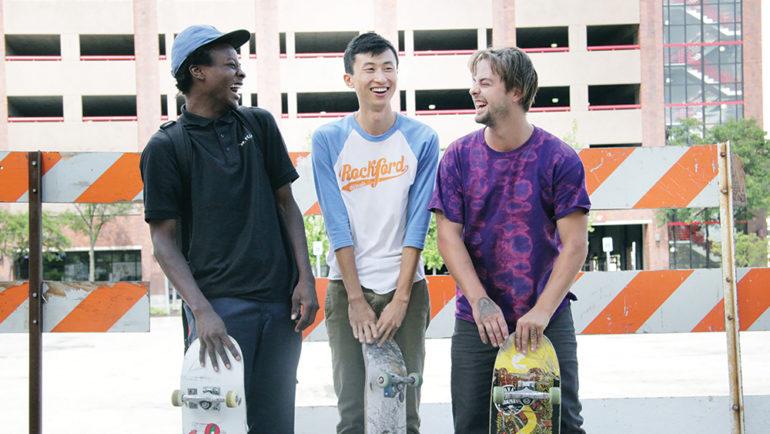‘Minding the Gap’ Chronicles a Boyhood Through Skateboarding
By Todd Gilchrist
LOS ANGELES (Variety.com) – A broken skateboard forms a heart on the poster for “Minding the Gap,” Bing Liu’s documentary about three young men, including himself, who used skating as an escape from their own broken childhoods in Rockford, Ill. Nominated at the 91st Academy Awards, the film is far more than a tribute to the healing powers of an often-vilified sport; it’s a real-life and decidedly more complex version of Richard Linklater’s “Boyhood” filtered through the culture of a community that provided an unexpected home for these, and it turns out, many other kids who felt alienated from, abused or discarded by their real families.
Despite his lifelong passion for skateboarding, Liu says he initially tried to avoid making a film that focused on it. “Skateboarding has such a bad rep,” he says. “For years, it’s been a punching bag for mainstream society, so I didn’t want to do a skateboarding film. I always thought of it as this story that really resonates with me that just happened to take place in the culture and community of skateboarders.”
When a search for answers about his own upbringing revealed parallel anecdotes and experiences from friends he’d grown up with, Liu realized that the wealth of footage he’d accrued over the years as resident documentarian for himself and his friends had unknowingly prepared him to make a film quite literally documenting their lives from adolescence to adulthood.
“I graduated at 23 and I was traveling around the country interviewing skateboarders, and pretty quickly there was a theme of family strife and issues with parents, memories that are difficult to process,” Liu says. “But it wasn’t until this one person I spoke to in St. Louis, this one father was saying how everyone was skating under this bridge and this skate park instead of at home on Father’s Day, that it hit me, ‘oh, what if this project is about skateboarders’ relationships with their fathers?’ ”
Given his quest for answers, Liu ironically hadn’t considered putting himself on camera until long after he’d embarked on documenting the lives of his friends Zack and Kiere. But sorting through old footage in search of some connective tissue for the editing room, he realized that he wasn’t merely observing their stories, he was part of them.
“I was just looking for selfie footage of myself, I stumbled upon this one clip of Kiere getting into a fight and breaking his board, and I didn’t know it was Kiere. He was 12 and I was 18, so at the time he was just a kid to me. But it conjured up a lot of memories of what I went through when I was that age, and I think that helped with thinking about
my own storyline.”
Though the film ends hopefully, “” unflinchingly shows Liu confronting his mother and reckoning with his own abusive childhood at the hands of her husband. But the filmmaker says he’s gratified that sharing these uncomfortable moments has resonated with audiences. And perhaps helped reconcile some of their own traumas, not just by celebrating the healing power of his and his friends’ skateboards, but chronicling the hard work that necessarily takes place in between those liberating rides.
“I felt the catharsis right away,” he says. “And throughout this past year I’ve learned that it’s been cathartic for a lot of people, way beyond young people. It felt really nice to be able to get at some of these things on camera.”

